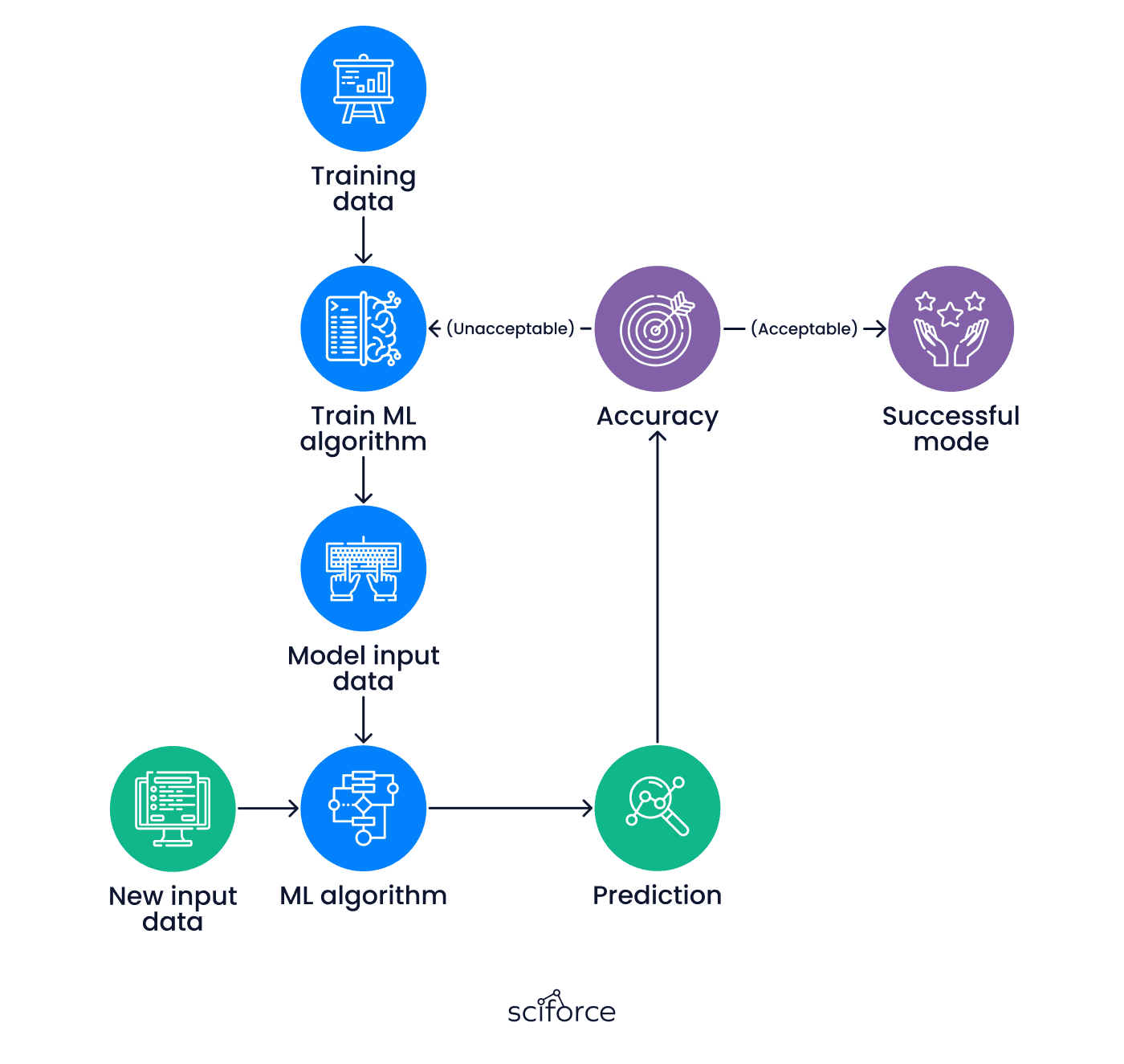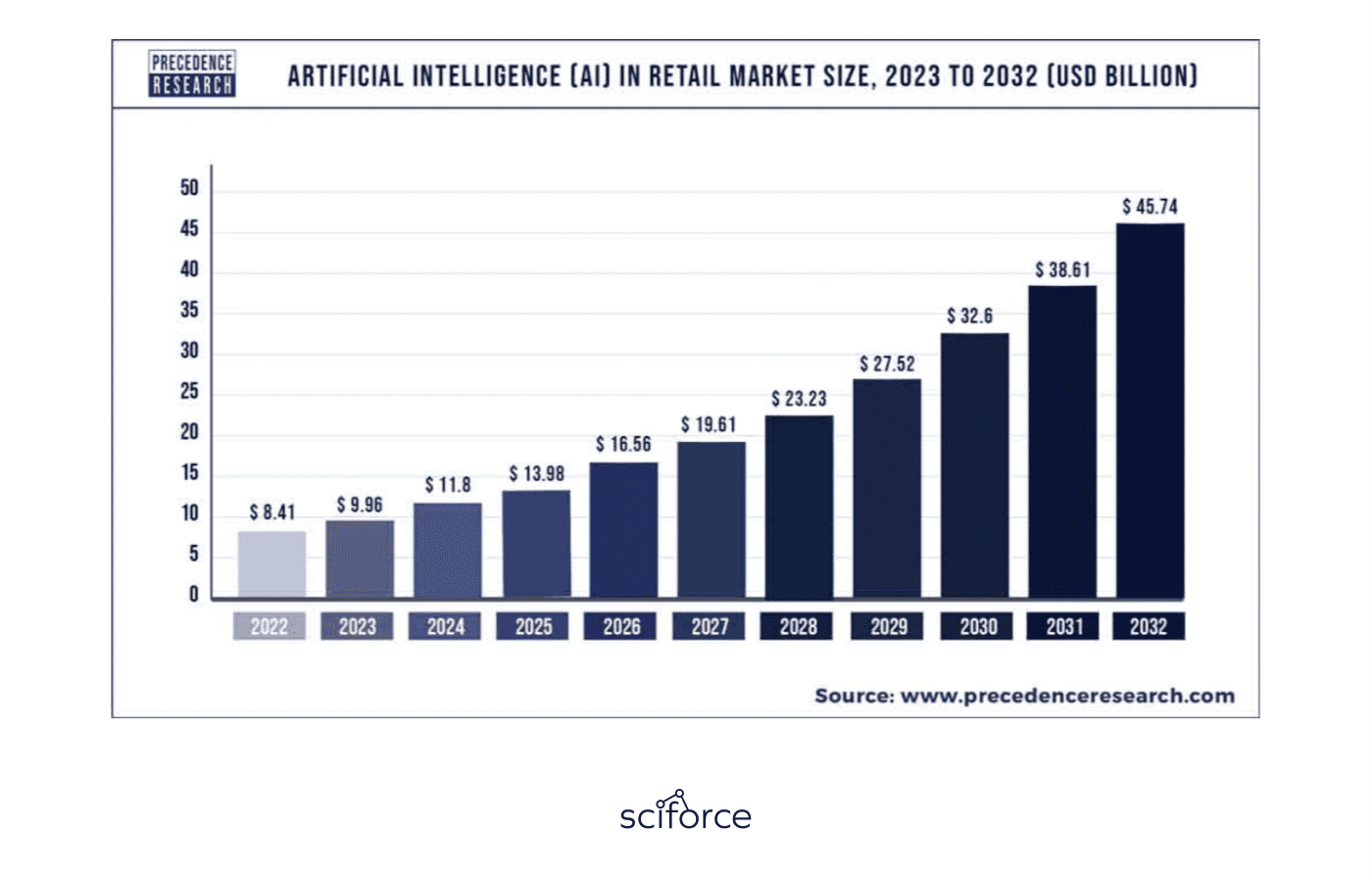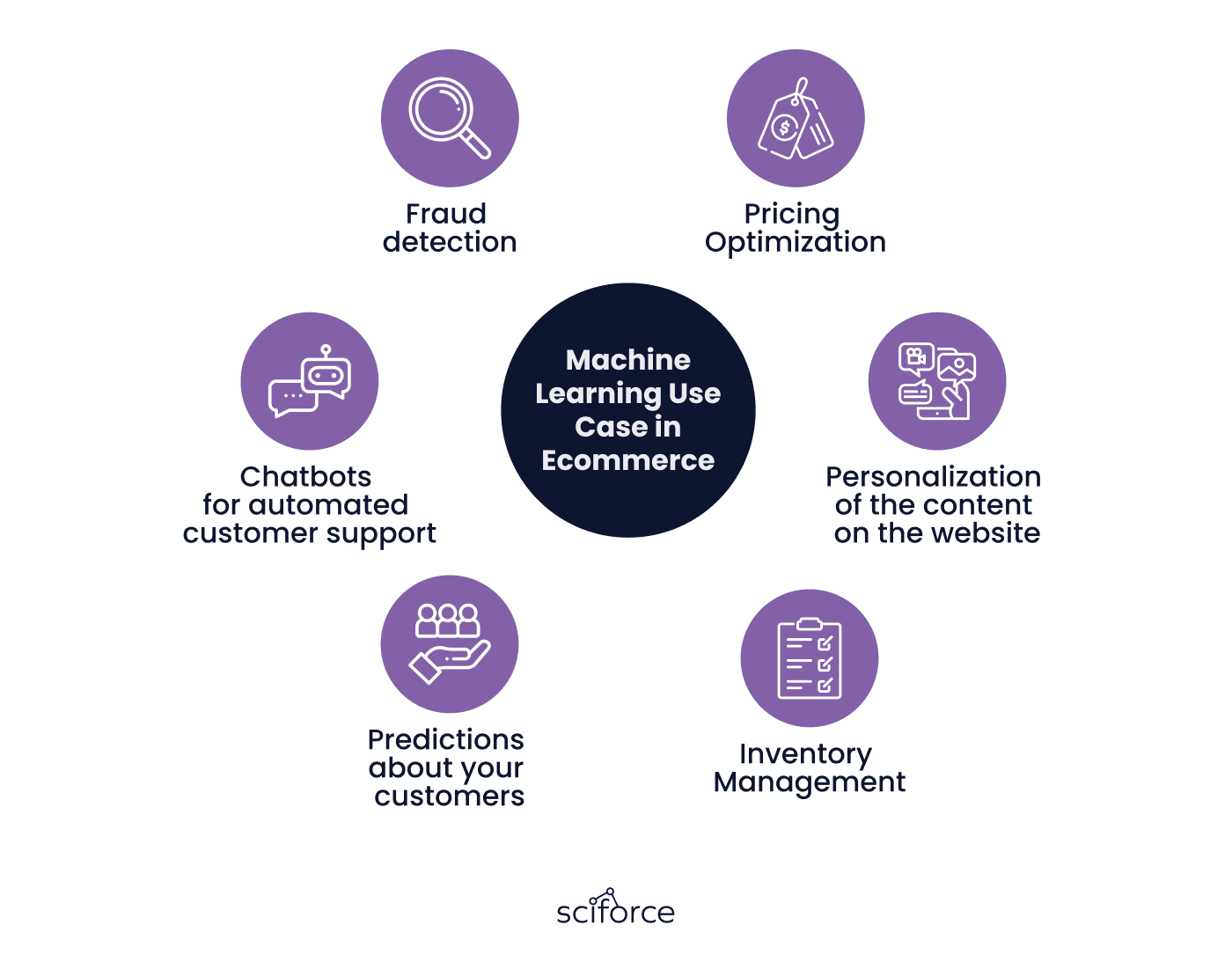AI is constantly changing the world by boosting, simplifying, and optimizing many everyday processes. And today, this technology is accessible for businesses and customers as never before. Many companies are implementing AI and ML, which allows them to bring new innovative solutions and comply with the customers' high standards and demands.
Every year AI becomes capable of new processes. In 2019 35% of organizations have Implemented AI in some form, and 42% of companies are exploring AI to use it in the future, according to TechJury. Also, Gartner states that customer satisfaction, cost reduction, or revenue will grow by at least 25% by 2023 in eCommerce companies that use AI. And Finance Digest tells us that AI will power 95% of customer interactions by 2025.
Artificial Intelligence, and Machine Learning, in particular, can solve many problems your business faces: from predictions about your customers to inventory management and fraud detection. So, how can ML help your company?
In this article, we will discuss the following aspects of how ML works and how to use it in E-commerce, the benefits of using this technology in retail, use cases of ML in e-Commerce, and advice for its implementation.
Machine Learning is a subfield of AI that empowers computers to learn from experience. Simply, ML algorithms can be trained by processing huge datasets. As a result of such training, ML allows you to spot patterns and anomalies within all this data and predict many outcomes your company can use. The implementation of such technology has numerous applications in E-commerce, which we will discuss later in this article.
In the picture below, you can see how machine learning works.

ML algorithms use computational methods to extract information from the data directly, so there is no need to rely on predetermined equations or models. These algorithms progressively enhance their performance as the volume of available samples for learning increases.
In the matter of E-commerce, machine learning opens many new opportunities for the retail industry by optimizing the customer experience, enabling greater flexibility, and establishing a robust digital presence. From enhancing simple processes to complex tasks, machine learning changes the E-commerce industry to meet better customer needs, which are constantly growing.
Before discussing the benefits of ML in e-commerce, let us provide you with some statistics on the AI market size in this field.
According to Precedence, research, global AI in retail market size accounted for USD 8.41 billion in 2022, and it is projected to attain around USD 45.74 billion by 2032, poised to grow at a CAGR of 18.45% during the forecast period 2023 to 2032:

Now, let's discuss how we can use the outstanding abilities of machine learning for the online retail industry:
Personalization: The implementation of technologies will positively impact the shopping experience of your clients. ML can detect different behavior patterns of your customers and, thus, can create personalized discount offers, targeted ads, and recommendations of similar or popular products.
Interactivity: you can boost customer support and sales by implementing interactive solutions like chatbots and contextual shopping features.
Logistics: AI will simplify the monitoring of your inventory and product delivery and forecast demand for different products.
Security: using ML in the security aspect of e-commerce will help you to ensure safe transactions, protect the data of your clients, and detect fraudulent behavior.
And now, let us show you the most common application cases of ML in digital commerce.

Let’s discuss them in detail:
Pricing Optimization
According to BigCommerce, price is one of the most important factors when choosing goods for at least 47% of customers. Of course, there are many factors that make an impact on the prices, like demand, supply, international shipping, etc. So, when the prices are too high in comparison with competitors, the abandoned carts rate grows. To minimize such risks, an ML-driven solution will take all relevant factors into account and automatically modify pricing, ensuring that production profitability is maintained well.
Personalization of the content on the website
If bringing an outstanding personalized shopping experience is your goal, machine learning can be a great tool for that. By analyzing what other customers bought previously, particular search, location, approximate age, interests, behavior on your website, and other factors, AI can predict specific products customers may be interested in.
Inventory Management
Inventory management sounds like a complex task for a regular person: you need to keep track of storing, order new materials, understand trends, etc.
Though machine learning allows you to predict the demands of your customers, future trends for supply, and even cash flow by monitoring your inventory.
Predictions about your customers
Machine Learning can tell you a lot about your customers, such as:
It's important to know how much money a customer is more likely to spend in your store over some period of time. Also, you can identify customers who are the most valuable and deserve special attention. Predicting if a customer will make a purchase
Artificial intelligence can notice when a is checking/comparing the prices. For example, a customer regularly purchases the same amount of some product from you, and, in one moment, this client logs into your website and does not buy anything. As a human, you will never spot it, but AI will. It can also provide such clients with a personal discount, which increases the probability of purchasing on your website.
Based on the behavior of your clients, such as making smaller purchases and returning to your website less frequently, ML algorithms can spot consumers who will probably abandon your website. In such a case, algorithms can initiate workflows targeted at retention. This will stimulate those customers to stay.
Machine learning predicts the client size based on the number of employees, company type, field, order frequency, and many other information. This can give you great insights into the aspects you need to pay attention to more and create personalized offers.
Chatbots for automated customer support
Having a huge support team is very effective for customer experience, though it can be too expensive. Customers often have similar questions, so it would be better to automate responses to such questions or create a FAQ page.
However, we do not recommend you to fully rely on AI because some non-typical cases can be resolved with the assistance of humans only. So, in such cases implementing an AI-based chatbot can be a great solution. Those chatbots can carry on a conversation with consumers by using previously prepared answers and by learning from each conversation.
Fraud detection
Online shopping is constantly getting the attention of fraudsters as there are many websites with poor security quality. Well, machine learning can detect fraudulent behavior by defining patterns that do not match the activity of regular clients.
Recommendation system
Recommendation systems enhance the customer experience and increase the amount of sales. By analyzing user behavior, purchase history, and any other relevant data, the system can create personalized product recommendations. Such systems have broad usage among small and big companies. For example, Netflix uses ML to create customized recommendations for users based on multiple factors and claims that the offered movies and TV shows match 99% of the user’s preferences.
To create an effective strategy, we follow many steps, so here are some basic stages we go through:
Step 1: We define objectives and goals
At first, we need to understand the goals that the client wants to achieve with machine learning. The most common goals are improving product recommendations, personalizing customer experiences, fraud detection, inventory management, demand forecasting, and optimizing pricing strategies.
Here we also think about scalability aspects and security strategies we need to implement.
Step 2: We assemble a team
After defining the main goals of the ML adoption, we formed a team of experts who will work on it. The team composition may vary depending on the complexity of the project, goals, and other factors. The team may include data scientists, machine learning engineers, project managers, and data analysts.
Step 3: Collecting and Preparing the data
We collect any data that can be relevant to the goals of eCommerce projects of our clients. For example, this can be data regarding transaction history, user website interactions, customer demographics and age, product attributes, and more.
Step 4: Choosing the right Machine Learning algorithms, and developing and training ML models
Based on the needs of our customers, we choose the right algorithm and, after that, develop and train ML models.
Step 5: Integration of the model into the eCommerce platform
After the previous steps, we implement the trained machine learning models into your eCommerce platform. Depending on the infrastructure, this process may need integration of APIs or direct embedding of models into the codebase.
Machine learning is revolutionizing the e-commerce industry by providing innovative solutions to meet customer demands. ML algorithms analyze data, enabling personalization, interactivity, logistics optimization, security enhancement, and fraud detection. By using the power of AI, companies can optimize different processes, enhance customer experiences, increase sales, and prevent fraud. We believe that implementing machine learning into your business is key to staying competitive in a rapidly evolving digital world.